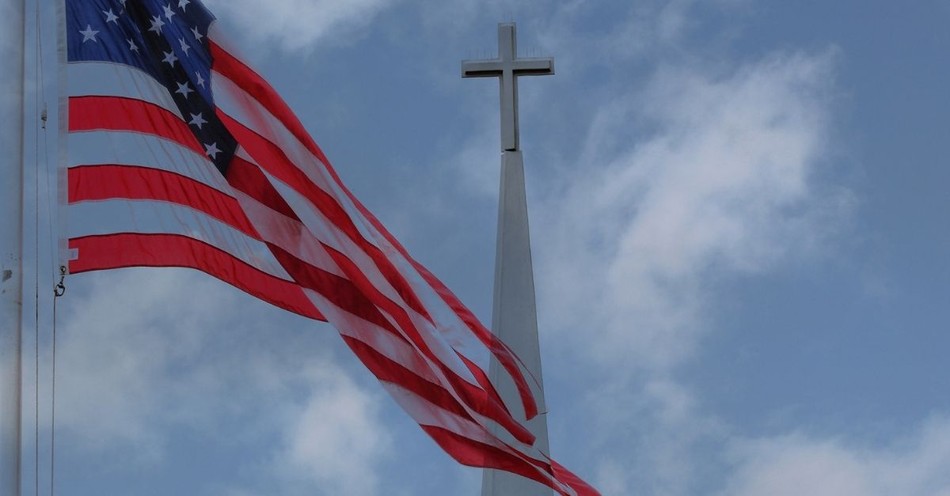Seven hundred years ago, Italian scholar Marsilius of Padua helped lay the foundation for our modern ideas of popular sovereignty. In his book Defensor Pacis, written in the context of an ongoing battle in Church-state relations, he anticipated the idea of separate spheres for Church and state.
Though tensions over the balance of power between Church and state were probably inevitable, it took surprisingly long for them to develop. In the Roman Empire, the state regulated religious practice. Christianity was an illegal religion in the Empire for nearly 300 years, but when legalized, a precedent was set for the Church to operate separately from the state. For centuries, the two sides cooperated without much fundamental conflict.
In the Latin West, questions about the relationship between Church and state arose at the end of the eighth century. In 799, Pope Leo III was accused of a variety of crimes. He appealed to Charlemagne, the king of the Franks, for judgment. Though unsure whether he had jurisdiction over the Pope, Charlemagne acquitted Leo. Since this suggested Charlemagne was over the Pope, Leo decided to redress the balance by crowning Charlemagne emperor on Christmas of 800, implying papal authority over that office.
After Charlemagne, both the Church and the state suffered serious decline for nearly a century. The title of emperor fell into disuse, and the papacy descended into a period of moral degeneracy. In the late 900s, with the aid of Church reformers, the Germanic King Otto I managed to centralize enough power to be named Holy Roman Emperor. He and his successors deposed a series of corrupt popes and appointed reformers in their place.
These reforming popes soon found their dependence on the emperor both theologically and politically problematic. Politically, by playing around with the rules and making deals with the emperor’s enemies, they managed to loosen the papacy from imperial control. Theologically, they began to argue that as the eternal is superior to the temporal and the spiritual to the physical, the Church is superior to the state and the pope to the emperor. In effect, this meant the Church was over the state. The logic was that, since the civil government was established by God to enforce righteousness, and the pope was the vicar of Christ on Earth, he should be arbiter of what is righteous, and secular rulers must obey. If they failed to do so, the pope claimed the right to depose them, even the Holy Roman Emperor.
Unsurprisingly, the Holy Roman Emperors disagreed with this logic. An early conflict was over who should name and install bishops. Since Otto I, bishops had been part of the imperial government, and emperors had insisted on their right to pick the bishops. The popes argued that bishops are primarily ecclesiastical offices and should be appointed and installed by them. This issue came to a head when Pope Gregory VII excommunicated Emperor Henry IV and tried to depose him, while Henry also tried to depose Gregory and even invaded Italy to make it stick. The issue was eventually resolved by their successors. But the basic question of whether the pope was over the emperor or the emperor over the pope continued to fester, sometimes resulting in war, excommunications, and the appointment of anti-popes.
In the context of these conflicts, Marsilius of Padua wrote his book. He took the imperial side, arguing that the Church had no jurisdiction in secular matters. It should interpret Scripture and define dogma, while secular affairs were the responsibility of the civil government, whose members were to be elected or appointed by the most important citizens. In the same way, he believed that clergy, including the pope, should be elected by the people or their representatives.
Even within the Church, papal authority was limited since supreme authority was vested in Church councils called by the emperor. Marsilius also argued that tithes should be eliminated, Church property should be seized by the government, and clergy should live in holy poverty. Marsilius’s work was supported by prominent Franciscans, including William of Ockham, who championed the ideal of apostolic poverty, and was later promoted by Thomas Cromwell to support Henry VIII during the English Reformation.
Defensor Pacis was an important step in advancing ideas of popular sovereignty and democracy, though it implicitly supported imperial authority. Despite its anticlericalism, it made important contributions to ideas about the proper relationship between Church and state. Given current debates about Christendom and Christian Nationalism, studying historical works like Defensor Pacis could enrich our understanding of the place of the Church in civil society.
This Breakpoint was co-authored by Dr. Glenn Sunshine. For more resources to live like a Christian in this cultural moment, go to breakpoint.org.
Image credit: ©Getty Images/Amanda Wayne
John Stonestreet is President of the Colson Center for Christian Worldview, and radio host of BreakPoint, a daily national radio program providing thought-provoking commentaries on current events and life issues from a biblical worldview. John holds degrees from Trinity Evangelical Divinity School (IL) and Bryan College (TN), and is the co-author of Making Sense of Your World: A Biblical Worldview.
The views expressed in this commentary do not necessarily reflect those of CrosswalkHeadlines.
BreakPoint is a program of the Colson Center for Christian Worldview. BreakPoint commentaries offer incisive content people can't find anywhere else; content that cuts through the fog of relativism and the news cycle with truth and compassion. Founded by Chuck Colson (1931 – 2012) in 1991 as a daily radio broadcast, BreakPoint provides a Christian perspective on today's news and trends. Today, you can get it in written and a variety of audio formats: on the web, the radio, or your favorite podcast app on the go.




